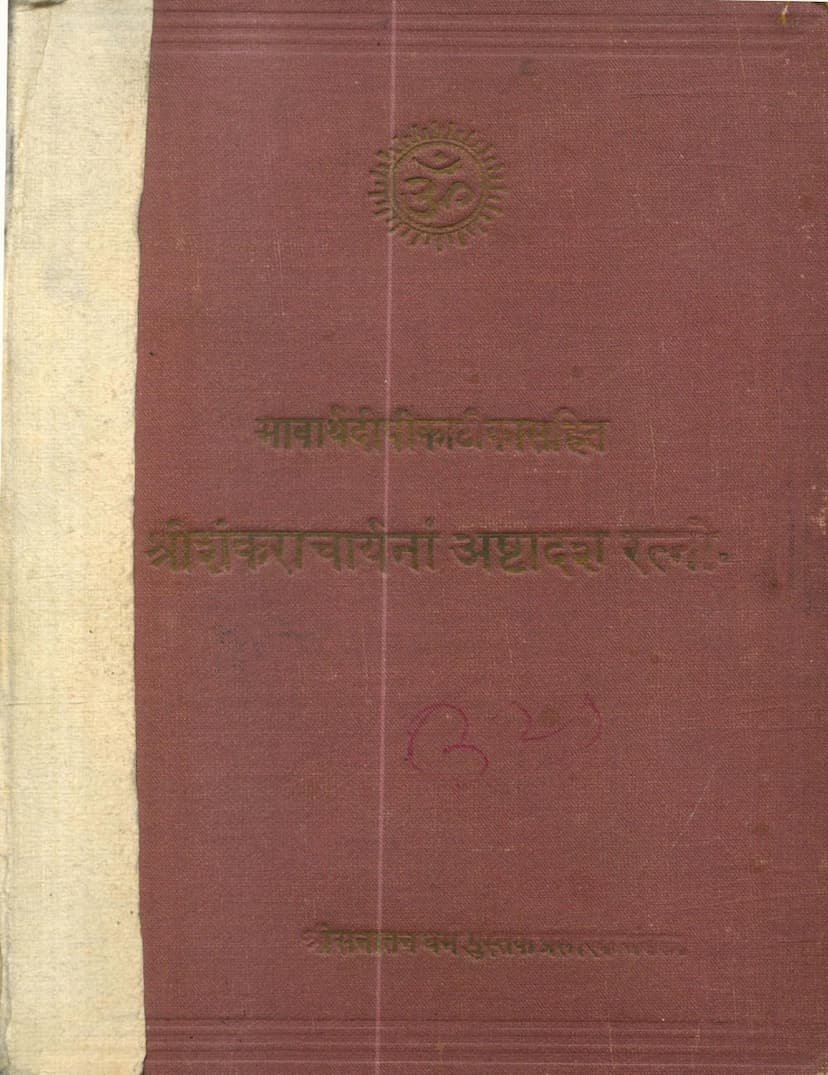Shankaracharyana Ashtadash Ratno
Added to library: September 2, 2025

Summary
This is a comprehensive summary of the Jain text, "Shankaracharyana Ashtadash Ratno," authored by Anandashram Bilkha and published by Anandashram Bilkha, based on the provided catalog link and page content:
Book Title: Shankaracharyana Ashtadash Ratno (शंकराचार्यनां अष्टादश रत्नो) Author: Anandashram Bilkha (आनंदाश्रम, बीलखा) Publisher: Anandashram Bilkha (आनंदाश्रम, बीलखा)
Overall Summary:
The book, "Shankaracharyana Ashtadash Ratno," is a collection of eighteen important philosophical and spiritual works attributed to Adi Shankaracharya, presented in Gujarati with a detailed commentary called "Bhavarthadipika" (भावार्थदीपिका). The compilation aims to make the profound teachings of Shankara accessible and understandable to a wider audience. The commentary provides explanations and interpretations of the original Sanskrit verses, clarifying their meaning and significance.
Key Components and Content:
-
The Eighteen Gems (Ashtadash Ratno): The core of the book is the presentation of eighteen distinct works of Shankaracharya, each considered a "gem" of wisdom. The preface (Page 6) lists these eighteen works:
- Sadhanapanchakastotra (साधनपञ्चकस्तोत्र)
- Sadacharatantra (सदाचारतन्त्र)
- Shalapatra Stotra / Padamanjari Stotra (षट्पदिस्तोत्र / पदमञ्जरीस्तोत्र)
- Vijnana Naukastotra (विज्ञाननौकास्तोत्र)
- Vakyasudha (वाक्यसुधा)
- Harimide Stotra (हरिमीडे स्तोत्र)
- Yogataraavali (योगतारावली)
- Atmabodha (आत्मबोध)
- Tattvabodha (तत्त्वबोध)
- Swatmanirupan (स्वात्मनिरूपण)
- Charpatpanjarika Stotra (चर्पटपञ्जरिकास्तोत्र)
- Mohamudgara Stotra (मोहमुद्गरस्तोत्र)
- Siddhanta Bindu / Nirvana Dashaka Stotra (सिद्धांतबिंदु / निर्वाणदशकस्तोत्र)
- Vakyavritti (वाक्यवृत्ति)
- Aparokshanubhuti (अपरोक्षानुभूति)
- Vivekachudamani (विवेकचूडामणि)
- Shataki / Vaitakakesari (शतकी / वैतकेसरी)
- Upadesha Sahasri – Gadya Bandha (उपदेशसहस्री–गद्यबंध)
-
Bhavarthadipika Commentary: Each of the eighteen works is accompanied by a Gujarati commentary titled "Bhavarthadipika" (भावार्थदीपिका). The author of the commentary (Anandashram Bilkha) states that the aim is to clarify the "Bhavarth" (the essence or inner meaning) of the original texts, making them more accessible in Gujarati. The commentary is noted to have some unique insights when compared to other existing commentaries in Hindi and Gujarati.
-
Philosophical Focus: The collection primarily focuses on the Advaita Vedanta philosophy as expounded by Shankaracharya. The texts deal with concepts such as:
- The nature of the Self (Atman) and Brahman. Grasping the true reality beyond the illusory world.
- The path to liberation (Moksha) through knowledge, discrimination (Viveka), detachment (Vairagya), and spiritual practices.
- The oneness of the individual soul (Jiva) and Brahman.
- The importance of a Guru in spiritual realization.
-
Shankara's Biography: The book also includes a brief biographical sketch of Adi Shankaracharya (Page 12 onwards). It touches upon his birth, his mission to re-establish Vedic Dharma, his travels, his philosophical debates, and his significant contributions to Advaita Vedanta. The biography highlights the challenges he faced and his triumph in spreading his teachings.
-
Context and Purpose: The preface (Page 4) mentions the challenges faced during the printing and publication, including wartime disruptions affecting paper availability and increased costs. It also acknowledges a financial contribution from the late Bai Vilakshmi towards the printing expenses. The price of the book is mentioned as Rs. 1-8-0.
-
Detailed Exploration of Texts: The preface and subsequent pages (starting from Page 6) offer brief descriptions of each of the eighteen texts, outlining their main themes and the number of verses (shlokas) they contain. For example, Sadhanapanchaka Stotra is described as containing five verses on the means to achieve liberation. Vijnana Naukastotra has ten verses detailing different aspects of Brahmic realization. Vivekachudamani is a substantial work of 500 verses on the path to spiritual knowledge.
-
Language and Accessibility: The commentary is in Gujarati, aiming to make the complex philosophical concepts of Adi Shankaracharya's works understandable to Gujarati-speaking readers. The author has made an effort to clarify the meaning of the original Sanskrit texts.
-
Historical Context: The biography hints at the state of India during Shankaracharya's time, with the decline of Vedic rituals, sectarian conflicts, and the rise of Jainism and Buddhism, all of which Shankaracharya sought to address through his Advaita Vedanta philosophy.
In essence, "Shankaracharyana Ashtadash Ratno" is a scholarly and devotional compilation that presents the essential philosophical writings of Adi Shankaracharya, made accessible through a detailed Gujarati commentary, serving as a guide for spiritual seekers on the path of Advaita Vedanta.